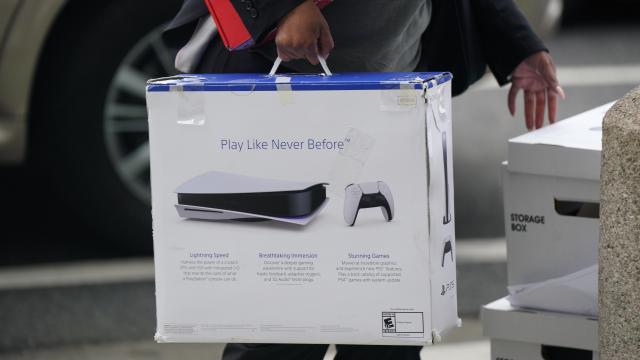California might soon become the state to be in if you want to finally repair your home electronics, but your busted console will still be off limits, as a new law makes specific exemptions for all video game electronics.
On Wednesday, California passed one of the nation’s most stringent and wide-reaching right-to-repair laws in the nation. Senate Bill 244 has received support from environmental groups, self-repair advocates like the company iFixit, and—most recently—the traditionally anti-right-to-repair Apple. It means companies now have to make service and repair facilities, documentation, and parts available for anybody who wants to fix their device at home for at least seven years after the device first hit the market.
SB44 now heads to a concurrence vote before eventually landing on the desk of Gov. Gavin Newsom for signing. In the wake of the bill’s passing, the writers at PCGamer were some of the first to note that the law has very particular language that contextualizes video game consoles differently compared to other consumer electronics. It denotes that video game consoles are not an “all-purpose computer,” effectively meaning it’s not beholden to any of the rigorous restrictions placed on other technology.
The specific language in the bill reads:
“‘Video game console’ means a computing device, including its components and peripherals, that is primarily used by consumers for playing video games, such as a console machine, a handheld console device, or another device or system. ‘Video game console’ does not include a general or an all-purpose computer, which includes, but is not limited to, a desktop computer, laptop, tablet, or cell phone.”
Those who own any modern console know the machines aren’t restricted to playing games. Most consoles, especially the Xbox and PlayStation, have long tried to bill themselves as full entertainment devices. Since the halcyon days of the Xbox 360 (back when it was even harder to repair a console suffering the red ring of death), consoles have allowed connections to streaming services like Netflix or YouTube. Today, Xbox is facilitating more outside apps, even allowing users to communicate with friends through Discord. You could very much describe both the PlayStation 5 and Xbox Series X as an “all-purpose computer.” This is less true for Nintendo’s current moneymaker the Nintendo Switch, but even the age-old Nintendo Wii let users watch their favourite Netflix content or browse the internet on Opera.
The bill itself refers to other kinds of devices as “electronic or appliance” products and nowhere else does it use the language for “all-purpose device.” The bill does not make references to smartphones, laptops, or tablets, except in the section dealing with consoles.
Video Game Console Makers Are Afraid of Piracy
In a phone interview. U.S. Public Interest Research Group’s head of RtR initiatives Nathan Proctor told Gizmodo that the video game companies specifically requested this kind of exemption in negotiations. The specific language was something they agreed to, but Proctor said the big thing that the console makers were concerned about was the potential that customers would jailbreak them and use them for piracy.
The big console makers are indeed very raw about piracy. Nintendo in particular has gone after those selling jailbreaking services, such as when it worked with U.S. law enforcement to indict several members of the Team-Xecuter modding community. Team-Xecuter website manager Gary Bowser pled guilty to selling hacked Switch chips back in 2021, and even as he leaves prison he’ll still be on the hook for millions of dollars owed to Nintendo.
“Manufacturers are very sensitive to any increased risk that they perceive,” Proctor said. “It’s a balance that needs to be struck. We buy these consoles, and we should have the right to fix them while also allowing for manufacturers protection of their IP.”
PIRG’s California arm CALPIRG was the lead in the negotiations surrounding the right-to-repair bill. CALPIRG Director Jenn Engstrom said console-makers have also made their devices exceptionally tricky to fix on your own. The disc drives are paired to the motherboard, meaning that if a customer wants to replace one, they must replace both. That, plus the console maker’s obstinance regarding piracy, meant that if the bill was to move forward advocates needed to leave consoles behind.
“We ultimately decided to exempt them,” she said.
That being said, repair advocates are still declaring major victory. Earlier this week, iFixit CEO Kyle Wiens said in a press release “The era of manufacturers’ repair monopolies is ending, as well it should be.”
But for video game consoles, it seems the status quo will stick around. Nintendo may have a new console coming in the near future, but all signs point to Microsoft and Sony remaining with the current console generation for years to come. Xbox CEO Phil Spencer said as much in an interview with Eurogamer last month. Spencer elaborated that doing a mid-gen “refresh” was difficult, and they’ll be unlikely to drop the cheaper Series S console anytime soon.
Engstrom said her organization had been working since 2018 with a “scrappy” group of environmentalists, consumer advocates, and a motley assortment of repair advocates to get this bill passed. The fact that video game consoles have been left behind is a shame, but with Apple coming around (the company touted its device’s repairability at its recent Wonderlust showcase), she’s hoping the video game companies see RtR as a “winning policy idea.”
